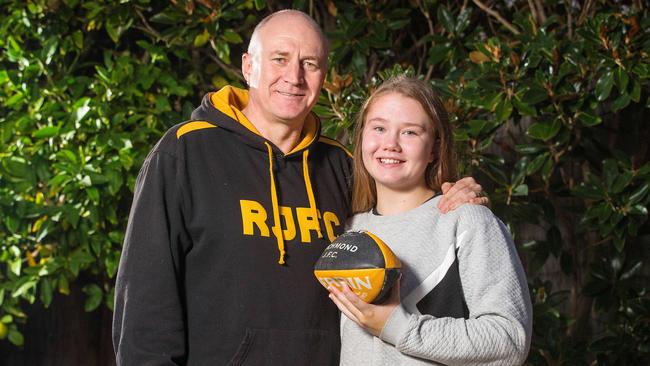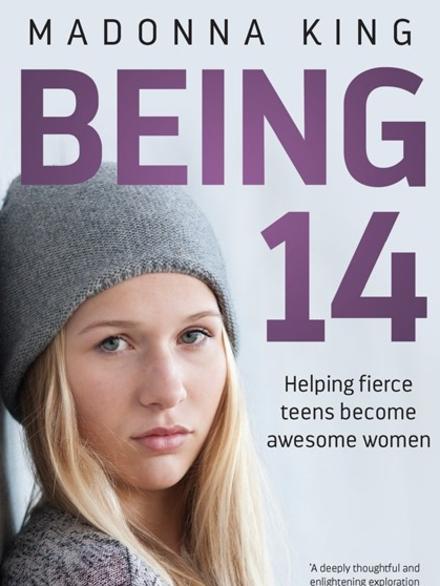Teen girls need help from parents through adolescence: experts
NAVIGATING the path from childhood to adulthood has always been tough for teenage girls — and things are getting worse, writes Anna Byrne.
News
Don't miss out on the headlines from News . Followed categories will be added to My News.
NAVIGATING the path from childhood to adulthood has always been tough for teenage girls. It’s a pimply, hormonal limbo, riddled with hurdles of emotional intensity, excruciating insecurities, physical disruptions and a mosh pit of sexuality and vulnerability.
But a whole new raft of added pressures and the rise of social media have research suggesting this could now be a generation of 13 and 14 year-old girls, in crisis.

Recent studies show that one in five teenage girls now suffer from clinical anxiety or depression, and according to psychologist and author, Steve Biddulph, things are getting worse.
Author of the million-selling Raising Boys, Biddulph is one of a number of authors now fighting for the mental health of our daughters, contributing to the ever expanding genre of literature dealing with the trials and tribulations of teenage girls.
In his latest book, 10 Things Girls Need Most, the parenting guru reveals the findings of an extensive investigation of teen girl culture, outlining a series of problems that afflict an average classroom of girls:
— Three to four of them, he says, self-harm.
— Three to four will be in the early stages of an eating disorder.
— Half the girls will be on diets.
— Four to five will be sexually active, but only doing it to please boys or to be interesting and special.
— One in five will be on anti-anxiety medication or antidepressants.
Biddulph’s chapters are a call to arms to combat the predatory marketers and advertisers who have helped objectify girls and women to such a powerful extent, while also encouraging parents to be present and engaged, because without embodied parental support, meaningful conversation, and firm boundaries, Biddulph is convinced that teenage girls will flounder.
So what is so significant about this age group?

Melbourne clinical child and adolescent psychologist, Dr Simon Crisp says social shifts are a huge factor in the swelling mental-health problems facing teenage girls.
“Theoretically, the beginning of adolescence is when young people hit puberty, which is starting much earlier today, but the social expectations on adolescents begin to shift upon entering secondary school,” he says.
“The age of 13 and 14 heralds a transition, where social relationships for girls can shift significantly. In primary school, girls usually focus on a single gender peer group and a social world that revolves around other girls.”
“In the beginning of high school, the focus shifts much more to relationships with boys, and while boys have always been present, there’s now an expectation of where it’s moving to, and they start to engage more with boys.”


“The critical issue for girls is that this happens at a time of increasing vulnerability, and at a time when culture emphasises sexuality, which now begins to form a part of their identity.”
The sense of a struggling generation has undoubtedly taken on new dimensions now that a girl’s coming of age comes at a time when worthiness can feel like it is measured in ‘likes’.
Dr Crisp says the rise of social media has been significant in reinforcing the dominant male position.
“In primary school, girls are mastering their world, consolidating their self-esteem, personal values, and then around the age of 14, they can start to feel like their sexual currency defines them, yet boys have the upper hand,” he says.
“Males are quite dominant on social media, while advertising and entertainment industries also shift towards a male dominated youth culture; it’s during adolescence that girls often begin to feel disempowered.”
“The prospect of being subjected to things like revenge porn, sexting and the rating of young girls by their male peers reinforces that they are in an oppressive world,” he says.
Australian journalist Madonna King, author of the recently released, Being 14, agrees that girls are most at risk of feeling pressured by boys online.
While in itself the digital world is a potentially fantastic tool for young people, the trouble starts when it becomes addictive, when it’s employed unwisely or when parental supervision is absent.
King encourages parents to deal with this preventively by getting familiar with all of the social media platforms used by their children, and tightening up privacy settings and boundaries when it comes to usage.

“We really need to be familiar with that culture,” she says.
“How can kids rely on their parents for help when parents haven’t even bothered to learn this stuff? I’ve had parents tell me their social media rules consist of not allowing devices around the kitchen table, but that just makes me laugh.
“Social media means kids can’t switch off, and fights that start at school will continue or even escalate. One school nurse I spoke with told me that home used to be a refuge for kids, but now they feel safer at school.”
Dr Crisp agrees that starting the communication in early childhood is key to giving teenage girls the skills, tools and information they need to journey through the teenage turmoil and to spotting the signs they are struggling.
“Pre-teen age is a really important time for the consolidation of one’s identity,” Dr Crisp says.
“Parents need to provide optimism and positive feedback based on their child’s values, capabilities and characteristics during this time, so that their identity is reinforced before they hit the age of 13.”
“Girls need to be prepared for the change to their social environment and children should be educated from an early age about gender equality; prevention is much better than dealing with the issue at the time.”
Crisp says an intervention should be a two-pronged approach from both parents and teachers.
“These are lessons that need to be established both within schools and by parents — sex education should be started young for girls if they are to be able to expect to be respected and so the experience can be positive and pleasurable, and something built on trust, respect and consent.”

“For this to happen, girls need to be skilled in deconstructing the oppressive nature of pornography and be ready to challenge those assumptions.”
“A key feature of anxiety is that people feel an inability to have control over a situation, so we should be educating girls to be empowered and capable — that’s a hugely protective factor in guarding against mental illness.”
For busy parents already stretched beyond capacity, it might seem overwhelming to consider being needed all over again by children who are close to adulthood and independence, but according to neuropsychiatrist Daniel Siegel, author of Brainstorm: The Power and Purpose of the Teenage Brain, challenging adolescent behaviour is largely due to profound changes that occur in the brain between the ages of 12 and 24.
Consequently, teenagers have an almost biological need for their parents, and research everywhere is affirming this, including a study from the University of Chicago on the profound impact of loneliness, now recognised as a teenage affliction.
Both Biddulph and King see adolescence as a second chance for parents to bond with their children, and to become more perceptive, and reflective.
“We’re all in this together,” King says. “Parenting is the one great leveller. Most of our 14 year olds will come out of the tunnel, but what matters is how quickly they come out, and how we can help them do it. I hate this idea that teenage girls are evil princesses or mean girls or anything like that, because all they’re trying to do is articulate that they want us.”
“I think schools are really beginning to understand these issues now. I’ve spoken to school principals who are doing a lot in that space, but the problem is that those things are hard to assess, and parents who pay a lot of money for education are still very invested in purely academic achievements.”
“What our girls really need is for us to hear them, because that’s not what they’re experiencing. If they feel heard, I think they’ll feel a lot more open to us.”


